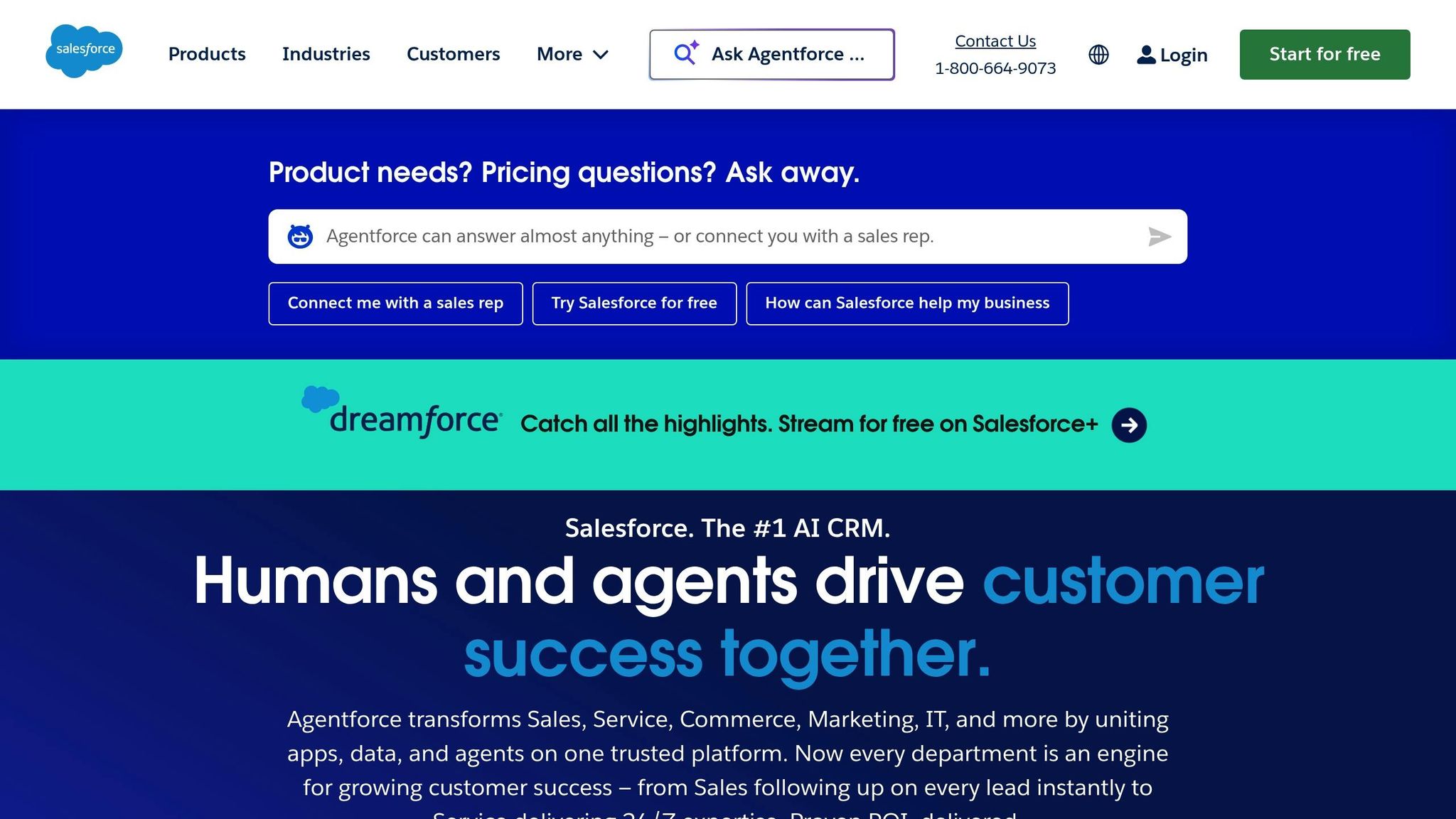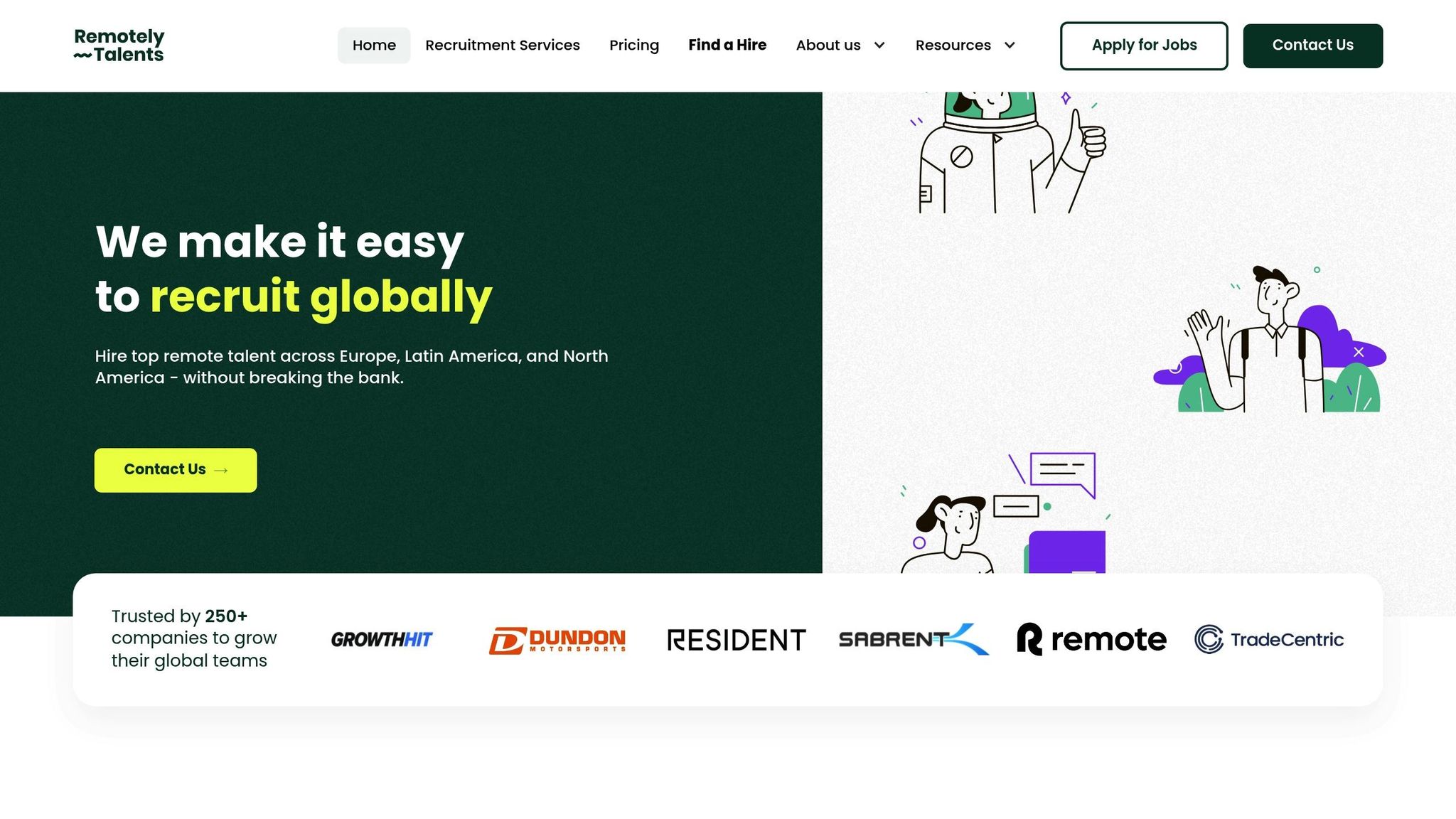How to Set Salary Benchmarks for UK Remote Teams

Setting competitive salaries for UK remote teams is no longer optional - it’s essential to attract and retain top talent. With remote work reshaping pay structures, companies must align salaries with market data, job roles, and regional differences while ensuring compliance with UK laws.
Key Highlights:
- Benchmarking Basics: Compare salaries to the market for fairness and competitiveness.
- Remote Trends: Flexible work and transparency are driving salary expectations.
- UK Salary Data: Mid-career roles in tech average $58,500–$79,300; London offers higher pay due to living costs.
- Compliance: Follow UK labor laws, including minimum wage and tax requirements.
- Action Plan:
Pro Tip: Partner with agencies like Remotely Talents for accurate data, recruitment support, and compliance assistance. Their expertise simplifies the process and ensures competitive pay structures tailored to your needs.
UK Salesforce Professional Salary Guide (UPDATED 2025)

Factors That Affect Remote Salary Benchmarks in the UK
Determining salary benchmarks for remote teams in the UK is not a straightforward task. A variety of factors come into play, shaping how much you should pay your remote employees. From specific job roles to broader economic trends, understanding these elements is critical for crafting a fair and competitive pay structure. Here’s a closer look at how job specifics, regional variations, and market conditions influence salary benchmarks.
Role, Industry, and Experience Level
The type of job, the industry, and a worker's level of experience all play a massive role in determining pay in the UK’s remote job market. These factors can lead to significant variations in salaries across sectors.
For instance, mid-career professionals in 2025 see notable differences in pay depending on their industry. Those in Information & Communication roles typically earn between £48,000 and £65,000, while Financial & Insurance positions offer salaries ranging from £45,000 to £60,000. In contrast, Retail & Wholesale jobs average around £24,000 to £32,000, and Accommodation & Food Services roles hover between £23,000 and £29,000 [1].
Experience level also has a significant impact. Entry-level positions in Information & Communication start at about £28,000 to £38,000, but experienced professionals in high-demand fields, like cybersecurity, can earn upwards of £85,000 [1][8]. Specialized skills in areas such as AI, data analysis, and e-commerce management are especially sought after, often commanding premium salaries due to their scarcity.
Here’s a snapshot of salary ranges by industry and experience level:
| Industry | Mid-Career Benchmark (2025) | Entry-Level Range (2025) |
|---|---|---|
| Information & Communication | £48,000 – £65,000 | £28,000 – £38,000 |
| Financial & Insurance | £45,000 – £60,000 | £28,000 – £35,000 |
| Professional, Scientific & Tech | £40,000 – £55,000 | £26,000 – £32,000 |
| Retail & Wholesale | £24,000 – £32,000 | £20,000 – £24,000 |
| Accommodation & Food | £23,000 – £29,000 | £20,000 – £22,000 |
While job roles and experience levels are key, regional differences also play a major part in shaping salary expectations.
Regional Differences Within the UK
Even in the age of remote work, where location might seem less relevant, regional salary variations remain a significant factor in the UK. For example, mid-level roles based in London average around £110,000 with a typical 12% bonus, while similar roles in Wales offer approximately £74,300 with an 8% bonus [2]. The Midlands & East region averages £93,500, and roles in Scotland come in around £77,500 with a 9% bonus [2].
These differences often reflect local living costs and market demand. London’s higher living expenses justify its salary premiums, but other cities are catching up. Emerging tech hubs like Manchester, Reading, and Bristol are seeing increasingly competitive pay rates. Cities such as Birmingham and Glasgow are also experiencing salary growth, particularly in finance and retail sectors, as local demand rises. While some companies are moving toward location-agnostic pay structures, many still adjust salaries to align with regional factors, ensuring they account for local living costs and market conditions.
Economic and Market Conditions
Economic shifts have a direct impact on UK remote salary benchmarks. Inflation, for instance, has driven up salary expectations, while the demand for specialized skills has pushed certain roles into higher pay brackets. Cybersecurity specialists, for example, now earn between £60,000 and £85,000, reflecting the premium placed on their expertise [8].
The rise of hybrid and remote work models has also reshaped compensation strategies. Companies are now competing not just on base salaries but on total compensation packages, which include perks like remote work flexibility. In a time of economic uncertainty, staying attuned to market trends is essential for businesses looking to remain competitive.
Automation and AI adoption are further influencing salary dynamics. Roles that complement these technologies often see pay increases, while jobs more susceptible to automation may experience downward pressure on salaries. Remote workers who can demonstrate digital fluency and adaptability are better positioned to secure higher wages, as these skills become increasingly valuable in the evolving job market.
Tools and Resources for UK Salary Benchmarking
When it comes to UK remote salary benchmarking, having access to trusted tools and resources is crucial. Reliable data helps ensure competitive compensation, which is key to attracting top talent.
Reliable Salary Data Sources
For a solid starting point, the Office for National Statistics (ONS) is an essential resource. As the UK government's official employment data provider, ONS publishes detailed annual reports that break down salaries by region, sector, and occupation [1]. These reports offer a foundational understanding of pay scales across the country.
Meanwhile, platforms like Glassdoor, PayScale, and Reed provide more dynamic, real-time insights. These tools rely on user-reported salary data, giving a clearer picture of what employees are actually earning. Here’s what they bring to the table:
- Glassdoor: Combines employee reviews with salary information for added context.
- PayScale: Offers detailed insights tailored to specific roles.
- Reed: Focuses on UK-specific data, including regional salary trends.
For example, Reed's 2025 data highlights significant salary differences across regions. Large private sector roles in London average $167,800 annually, with bonuses reaching 29%. In contrast, similar positions in Wales fall between $105,800 and $130,300 [2].
| Source Type | Best For | Coverage | Update Frequency |
|---|---|---|---|
| ONS | Baseline benchmarking | UK-wide | Annual |
| Glassdoor/PayScale | Current market rates | Global with UK focus | Continuous |
| Reed | Regional trends | UK regional | Quarterly |
| Industry Agencies | Specialized roles | Sector-specific | Annual |
For deeper insights, specialized industry agencies can provide a more granular view of salary trends.
Market Insights from Recruitment Agencies
Recruitment agencies, such as Remotely Talents, are invaluable for accessing exclusive salary data and market trends not typically found in public databases. By working directly with companies across industries like Marketing, IT, Finance, and Sales, these agencies compile real-world compensation packages and hiring patterns.
For instance, Remotely Talents’ "Global Salary Guide - 2025" offers detailed insights into international pay trends for remote roles [10]. They’ve identified rising salaries in cybersecurity, with professionals earning between $73,200 and $103,800 in 2025 [8]. Recruitment agencies often spot these shifts before they appear in public datasets, giving businesses a competitive edge.
Combining Global and Local Salary Data
To create the most accurate benchmarks for remote teams, it’s essential to blend global salary trends with UK-specific data. Global data sheds light on international expectations for remote roles, while local data ensures compliance with UK laws and alignment with market rates [8][5].
As remote work expands the talent pool, UK-based employees increasingly compare their salaries to international benchmarks. Balancing these global expectations with local factors like taxes, legal requirements, and cost of living is critical. Offering competitive base salaries alongside benefits such as flexible schedules, professional development funds, or home office allowances can make a difference.
Agencies like Remotely Talents excel at striking this balance. By combining global insights with solutions tailored to UK-specific challenges, they help businesses navigate the complexities of remote work compensation [10]. This dual approach ensures your salary benchmarks remain competitive while addressing the unique realities of employing remote teams in the UK.
Step-by-Step Guide to Setting Salary Benchmarks for UK Remote Teams
Using reliable market insights, follow these steps to establish competitive salary benchmarks for your UK-based remote teams.
Define Job Roles and Responsibilities
Start by creating detailed job descriptions that outline the role's expectations and the specific skills required for remote work. This clarity ensures you're comparing similar roles when analyzing market data and helps avoid potential pay disparities. Be sure to include key details such as required experience, primary responsibilities, and expected outcomes. For remote positions, highlight aspects like communication needs, time zone overlap, and the tools necessary for collaboration.
To streamline the process, you can use a job description generator to maintain consistency. Don’t forget to account for remote-specific factors such as flexible working hours or the technical requirements of a home office setup. These elements can influence both the talent pool and compensation expectations.
Research Market Pay Rates
Once you've defined the roles, gather salary data from credible sources. Combine official data, like government labor statistics, with real-time insights from platforms such as Reed, Glassdoor, and PayScale. Industry-specific guides, like Remotely Talents' "Global Salary Guide – 2025" [10], can also provide valuable insights tailored to remote roles.
Keep regional pay differences in mind. For instance, salaries in London are often 10–25% higher than in other parts of the UK [1][7]. A mid-level software developer in London, for example, might earn between $61,000 and $79,300. Additionally, consider the full compensation package, including perks like flexibility premiums, home office stipends, or enhanced benefits, rather than focusing solely on base salary.
Balance Internal Pay Structure with Budget
While market data offers a useful benchmark, it’s essential to align these insights with your organization's existing pay structure and budget. Remote hiring can cut staffing costs by as much as 70% [10] by eliminating office-related expenses, which can enable more flexible salary allocations.
Review your current salary bands to maintain internal equity. Pay gaps for similar work can negatively affect morale and lead to higher turnover rates. Consistency in compensation reinforces fairness within your team. Beyond salary, think about offering benefits like flexible schedules, professional development opportunities, and additional vacation time. Document your pay decisions clearly to ensure transparency and fairness.
Review and Update Benchmarks Regularly
Salary benchmarking isn’t a one-and-done task. Remote work markets evolve quickly, so updating your benchmarks regularly is key to staying competitive. Plan for an annual review of salary data, or even more frequent updates for roles in fast-changing sectors.
For high-demand positions, such as those in tech, periodic reviews are essential to account for rapid market shifts. Keep an eye on trends like hiring challenges, unexpected turnover, or industry changes that could signal the need for adjustments. With remote and hybrid work becoming a top priority for UK job seekers [3][9], salary expectations can shift rapidly.
To stay ahead, establish a clear process. Document the data sources you’ll use, assign responsibilities for analysis, and outline how decisions will be shared with stakeholders. Partnering with recruitment agencies like Remotely Talents, which provide ongoing market insights, can help you keep your salary benchmarks aligned with the latest trends. Regular updates ensure your compensation strategies remain competitive in the evolving remote work landscape.
sbb-itb-88a7fe6
Legal and Compliance Requirements for UK Remote Salaries
Once you've established solid salary benchmarks, the next step is ensuring compliance with UK labor laws. Competitive pay is just one piece of the puzzle when building a strong remote team. Ignoring legal obligations can lead to hefty fines, legal disputes, and damage to your company's reputation.
UK Labor Laws and Remote Work Policies
Remote workers in the UK are entitled to the same legal protections as their office-based colleagues. According to the National Minimum Wage Act 1998, all employees must earn at least the statutory minimum wage - currently £11.44 per hour for those aged 21 and over (as of April 2024) [1]. This rule applies no matter where the work is performed.
The Equality Act 2010 ensures equal pay for equal work and prohibits discrimination based on factors like gender, age, or race. Meanwhile, the Employment Rights Act 1996 guarantees remote workers access to statutory sick pay, holiday leave, pension contributions, and protection against unfair dismissal. The Working Time Regulations 1998 also set a 48-hour weekly work limit (unless workers opt out), along with minimum rest breaks and paid annual leave [1][8].
To avoid disputes, it's crucial to document your remote work policies. Include details about working hours, communication expectations, and performance standards. Also, assess health and safety risks and provide employees with the necessary equipment or guidance to create a safe home office environment [1].
Tax and Payroll Requirements
UK tax laws for remote workers mirror those for on-site employees. Employers must use the PAYE (Pay As You Earn) system to deduct income tax and National Insurance contributions from salaries. Additionally, Real Time Information (RTI) reports must be submitted to HMRC for each pay period [1][8].
Payroll should be processed in British pounds (£), applying the correct tax codes for each employee. Employers are required to provide detailed payslips showing gross pay, deductions, and net pay for every pay period. Mistakes in tax calculations or delays can result in penalties and backdated liabilities. Employers must also comply with auto-enrollment pension rules, enrolling eligible employees (those aged 22 to State Pension age earning over £10,000 annually) into a workplace pension scheme [1].
Using payroll software designed for UK compliance or working with a specialist provider can help ensure accuracy and adherence to these rules. Once payroll is in order, focus on creating transparent pay practices.
Best Practices for Transparency and Fair Pay
Being transparent about pay decisions builds trust and reduces legal risks. Document how you determine salaries, including factors like experience, qualifications, and performance metrics, to justify pay decisions [1][8].
Publishing salary bands can make your compensation structure clearer, and regular audits can help address any wage disparities. To ensure fairness, provide training on unconscious bias and establish structured pay review processes involving multiple stakeholders.
It's also essential to issue written employment contracts that outline salary, working hours, job responsibilities, and other key terms. Contracts should be provided on or before an employee's first day, with any changes communicated in writing [1][8].
Non-compliance can lead to severe consequences. For instance, failing to meet minimum wage requirements can result in HMRC penalties, while violations of equal pay or anti-discrimination laws may lead to costly tribunal claims and compensation orders [1][8].
Recruitment agencies like Remotely Talents offer valuable support, providing updated salary data, market insights, and compliance guidance. By integrating these practices into your compensation strategy, you can build a competitive and legally sound remote team.
How Remotely Talents Can Support UK Salary Benchmarking

When it comes to setting accurate salary benchmarks for remote teams in the UK, Remotely Talents provides a range of tailored services. From accessing reliable data to sourcing top talent and ensuring compliance, they make what is often a complex process much more manageable. Their approach helps businesses gain deeper market insights and streamline their recruitment efforts. Let’s dive into the details.
Access to Salary Data and Market Insights
Remotely Talents relies on trusted sources like Reed, Frazer Jones, and Resource Provider Ltd, alongside their own placement data and real-time analytics, to deliver precise salary benchmarks. For instance, projected mid-career salaries in key UK sectors for 2025 include:
- Information & Communication: $58,500–$79,300
- Financial & Insurance: $54,900–$73,200
- Professional, Scientific & Technical: $48,800–$67,100 [1][8]
Additionally, their "Global Salary Guide – 2025", available on their website, offers businesses a comprehensive tool to stay updated on pay trends for remote roles. This guide is particularly useful for companies aiming to remain competitive in attracting and retaining skilled professionals.
By combining multiple data sources, Remotely Talents provides salary insights tailored to roles, experience levels, and regions. These benchmarks also account for regional differences, ensuring companies can adjust compensation fairly and effectively.
Finding and Vetting Remote Talent
Specializing in five major sectors - Marketing & eCommerce, IT/Data/Engineering, Finance & Accounting, Operations, and Business Development & Sales - Remotely Talents excels at identifying candidates with sought-after skills. Roles like software developers, data analysts, and digital marketers are in high demand for UK-based remote teams, and the agency focuses on sourcing top-tier talent.
Their vetting process is thorough, incorporating skills assessments, background checks, and interviews. For example, IT candidates are tested on coding and remote collaboration tools, while finance professionals are evaluated on their analytical and advisory expertise tailored to the UK market [8].
To meet varying business needs, Remotely Talents offers two hiring models:
- On-Demand Plan: $1,450 per month per role, with a 90-day replacement guarantee.
- Partner Plan: Unlimited hiring at $1,000 per month, based on a 12-month commitment.
Both plans include a senior recruiter, account manager, weekly updates, and delivery of three to four qualified candidates within two weeks. The agency focuses on candidates from Europe and Latin America, ensuring all hires have strong English proficiency (C1+ level) for seamless communication with UK teams.
Simplified Recruitment and Compliance Support
Remotely Talents doesn’t just stop at finding and vetting talent - they also handle the complexities of recruitment and legal compliance. From drafting employment contracts to managing payroll and tax obligations, they ensure your remote team aligns with UK labor laws, including IR35 regulations, National Insurance, and pension contributions.
Their expertise extends to crafting pay structures that balance competitiveness with sustainability. By analyzing internal salary data and external benchmarks, they offer tailored recommendations on salary bands, regional adjustments (like higher pay for London-based roles), and overall pay equity across distributed teams [1][2].
Beyond compliance, Remotely Talents provides regular updates on market trends, such as the impact of automation, regional pay differences, and the growing demand for digital skills. Leveraging insights from industry experts and their own recruitment data, they help businesses stay ahead in the evolving remote work landscape [8][6].
UK companies can kick-start their collaboration with Remotely Talents by scheduling a salary benchmarking consultation. From there, the agency develops a customized recruitment plan, guiding businesses through every step - from defining job roles and salary ranges to onboarding remote employees. This hands-on approach ensures a smooth process and helps build high-performing remote teams.
Conclusion and Key Takeaways
Setting competitive salary benchmarks for UK remote teams is all about striking the right balance - relying on accurate market data while considering internal pay equity and the financial goals of your business. It’s a careful process that ensures you attract top talent without compromising fiscal responsibility.
Key Factors and Steps in Salary Benchmarking
To benchmark salaries effectively, you need to consider several core factors: the complexity of the role, the industry, the required experience level, and regional pay variations. A straightforward four-step process can guide you:
- Define job roles clearly: Outline responsibilities and expectations with precision.
- Research market pay rates: Use trusted sources like the UK Office for National Statistics and industry-specific salary guides.
- Balance external and internal factors: Align market benchmarks with your internal pay structure and budget constraints.
- Review regularly: Keep your benchmarks up-to-date to remain competitive and relevant [1][5].
Transparency and compliance are equally important. By publishing clear salary bands, openly communicating pay decisions, and conducting regular pay equity audits, you can foster trust within your remote team. At the same time, adhering to UK regulations - such as minimum wage laws, equal pay requirements, and proper tax and payroll practices - ensures your salary strategy remains compliant [4].
How Remotely Talents Can Help
Once you’ve outlined the basics, it’s time to put them into action. This is where Remotely Talents steps in. They offer tailored solutions to meet the unique needs of UK remote teams through their Global Salary Guide – 2025 and personalized consultations. These services provide data-driven insights specific to your industry and hiring goals.
Their pricing options are designed to fit different business needs:
- On-Demand Plan: $1,450 per month per role, ideal for flexible hiring.
- Partner Plan: $1,000 per month with a 12-month commitment, perfect for unlimited hiring needs.
But they don’t stop at salary data. Remotely Talents handles the entire recruitment process, from sourcing and vetting candidates with C1+ English proficiency to managing tax, payroll, and compliance. By focusing on talent from Europe and Latin America, they ensure time zone compatibility and strong alignment with UK-based teams.
Ready to take the next step? Schedule a salary benchmarking consultation with Remotely Talents. They’ll help you assess your current pay structures, refine your hiring strategy, and create a customized plan with competitive salary recommendations. With their support, building high-performing remote teams becomes a seamless, efficient, and compliant process.
FAQs
How can companies align market salary benchmarks with their internal pay structure and budget?
To strike the right balance between market salary benchmarks and your internal pay structure, start by diving into industry standards and regional salary data for remote roles in the UK. This step ensures your pay rates stay competitive, making it easier to attract skilled professionals. At the same time, assess your company's financial limits and focus on prioritizing roles that directly support your business objectives.
Equally important is fostering transparency with your team about how salaries are set. Open communication builds trust and helps employees see how their pay aligns with market trends and the company's financial strategy. If simplifying the recruitment process for remote talent is a priority, partnering with a specialized agency could save time and help you efficiently find and onboard high-caliber candidates.
What should businesses consider to comply with UK labor laws when setting salaries for remote teams?
When determining salaries for remote teams in the UK, businesses need to follow labor laws closely. This includes meeting minimum wage standards, adhering to equal pay rules, and fulfilling tax obligations. Salaries must align with the UK’s National Minimum Wage or National Living Wage, depending on the employee's age and employment status.
Employers also need to factor in statutory benefits, such as paid time off, sick leave, and pension contributions. Another key step is correctly classifying workers as either employees or contractors to avoid the risks tied to misclassification. To navigate these requirements effectively, consulting an HR or legal expert with expertise in UK labor laws can help ensure compliance and minimize potential issues.
How do regional differences in the UK affect salary benchmarks for remote roles, and should companies adjust pay based on location?
Regional differences across the UK, like varying costs of living and local job market demands, play a big role in shaping salary expectations for remote positions. For instance, wages in London and the South East tend to be higher than in other areas, largely because of steeper living expenses and a more competitive talent market.
When deciding on pay structures, companies face a key choice: should salaries be adjusted based on an employee's location? A location-based pay model tailors compensation to reflect regional costs, which can make salaries more equitable for employees in higher-cost areas. On the other hand, offering consistent pay scales across all regions can streamline payroll processes and foster a sense of equality within the team. The right approach depends on your company's priorities, budget constraints, and how you aim to attract and retain talent.
Related Blog Posts
Read also
Ready to get started?
If you want to dive into the details just Book a Free Consultation with our staff and we’ll be happy to answer your questions.





